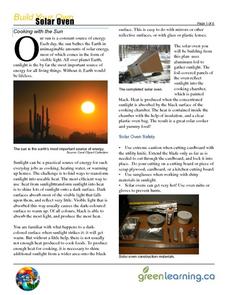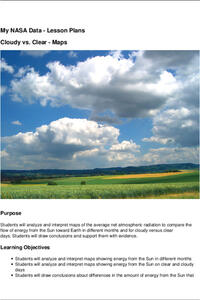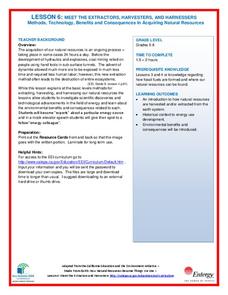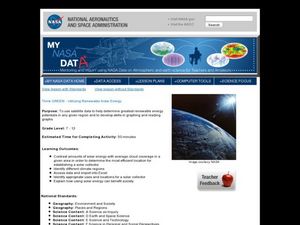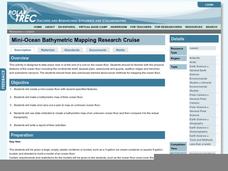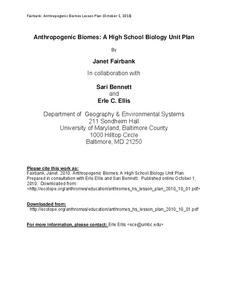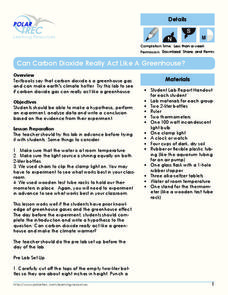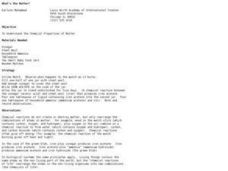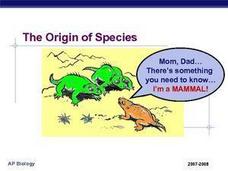Green Learning
Build Your Own Solar Oven
This is not exactly a lesson plan, but rather a six-page document detailing how to build a solar oven. A bit of background information, materials list, diagrams and photos, and clearly-written procedures are all included. There are no...
NASA
Cloudy vs. Clear - Maps
Find out the science of how clouds keep Earth cooler on hot days. Using guided discussions, investigators analyze and interpret maps of how much solar energy Earth receives at different times of the year. Participants draw conclusions...
International Technology Education Association
Reinventing Time
Take a trip through time. A lesson resource provides instruction on the origin of current measurements for time. The text explains the different tools humans used throughout history to measure time as well as provides examples such as...
Curated OER
Earthquakes and Volcanoes
Even though volcanoes look alike, they can be very different based on the types of lava that erupts from their surface. Learn about strata volcanoes, shield volcanoes, and the varying viscosity of lava with an engaging hands-on activity....
Curated OER
Does cloud type affect rainfall?
Student use MY NASA DATA to obtain precipitation and cloud type data. They create graphs of data within MY NASA DATA. Students compare different cloud types, compare precipitation, and cloud type data They qualitatively describe graphs...
Curated OER
A Design You’ll Dig: Designing a Habitat for Worms
Students discover how worms contribute to the balance of the environment. In this composting lesson plan, students study the composting and decomposition processes. Students then create habitats for worms that allow them to do their jobs.
National Wildlife Federation
Meet the Extractors, Harvesters, and Harnessers: Methods, Technology, Benefits and Consequences in Acquiring Natural Resources
There are advantages and disadvantages to all sources of energy; the trick is determining which one has the least impact! Part six in the series of 12 has learners further explore energy resources. After reading information about one of...
American Museum of Natural History
Rising CO2! What Can We Do?
It is colorless and scentless, but it makes a large impact on the environment. Learners explore carbon dioxide emissions and what they mean for the environment using an interactive graph. They review changes over time and how they impact...
Curated OER
Think GREEN - Utilizing Renewable Solar Energy
Students use data to find the best renewable energy potential. In this solar energy lesson students import data into Excel and explain how solar energy is beneficial.
Curated OER
Freshwater Fish Anatomy & Taxonomy
Tenth graders use a classification key to identify organisms. In this classification lesson students identify freshwater species of fish and document their observations.
Curated OER
A Matter of Accountability
Pupils conduct a mock trial focusing on environmental accountability of industrialized nations. As an example, they evaluate evidence provided on carbon dioxide emissions. They participate in a mock trial of industrialized nations by the...
Polar Trec
Mini-Ocean Bathymetric Mapping Research Cruise
Middle or high schoolers transform into oceanographers in a week-long simulation. To begin, each group follows directions to create a model of the ocean floor with specified features. Next, the groups prepare to set sail on a research...
TLS Books
Neptune
Did you know that Neptune is named after the Roman god of the sea? Young astronomers read about this and other facts about the eighth planet from the sun in a short informational text passage.
Curated OER
Anthropogenic Biomes
If you teach a man to fish, he will never go hungry—or he will overfish and permanently damage the ecosystem? Address the traditional biomes as well as the human-included ecosystems and contrasts the biotic and abiotic factors in each....
Polar Trec
Can Carbon Dioxide Act Like a Greenhouse Gas?
Ninety-seven percent of scientists who study climate agree that human activity is warming the planet. Learners explore carbon dioxide as a greenhouse gas, a gas causing this warming, through a hands-on experiment. Once complete, they...
National Wildlife Federation
An Energy Mix: Renewable and Nonrenewable Resources
What did the windmill say about renewable energy? I'm a BIG fan! Lesson three in the series of 12 has classes discuss potential and kinetic energy and then, in pairs, they complete a web quest over the different types of energy...
Forest Foundation
Forest Watersheds
Where does the water we use come from? To understand the concept of a watershed, class members study the water cycle and then engage in an activity that simulates a watershed.
Curated OER
Thirsty Rocks: Please "Porous" a Drink!
A simple activity goes a long way in demonstrating the property of porosity to your rock hounds. They will mass a specimen of dry sandstone and then soak it in a pre-measured amount of water. After seven minutes, they once again measure...
Curated OER
What's the Matter? (Living and Non-Living Things)
Understand how chemical reactions recombine atoms to create the "chemicals of life". An experiment, showing the basic chemical reactions of an iron nail or a match, helps young children start their understanding of permanent changes.
Curated OER
Physical Changes and States of Matter - Two
Here's a wonderful lesson on how substances change states. Groups of learners are given trays with a chocolate bar, a piece of paper, an ice cube, and a balloon. During the activity, the groups closely observe the changes that each...
Curated OER
What is Deforestation?
An overview of deforestation is the focus of this resource, which present the reader with a list of facts. Ten comprehension questions follow; learners can write their answers on a separate piece of paper. Have your environmental...
Wilderness Classroom
Pollution
Educate scholars on pollution—air, water, and land—with a series of lessons that begin with a thorough explanation of each type. Learners then take part in three activities to reinforce the importance of reducing pollution. They...
Curated OER
Recycling Quiz
Ten multiple questions about recycling comprise this quiz. Administer this as a pre-test prior to presenting a lesson on recycling glass, plastic, and metals. Since an answer key is provided along with comments, you can use it as a guide...
Curated OER
Origin of The Species
After viewing information about different types of isolation, students will see that reproduction among a group will cause the frequency of a specific trait to increase. The history of prominent scientists such as Charles Darwin are and...
Other popular searches
- Science Earth Day Activities
- Science Earth Day Lessons
- Earth Day Science
- Earth Day Science Projects
- Earth Day Science Lesson Plans
- Earth Science Earth Day


